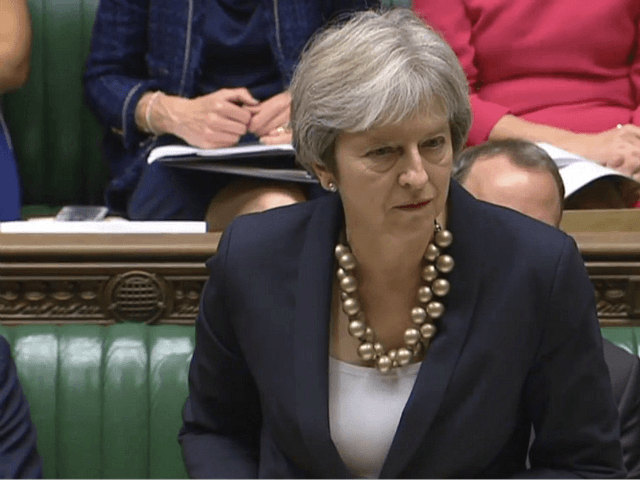Theresa May is reportedly considering splitting the Withdrawal Agreement vote to get around House of Commons Speaker John Bercow’s ruling that MPs could not vote on the same deal three times.
The prime minister is reportedly considering asking MPs to vote on the 585-page withdrawal treaty (the ‘divorce’ agreement) and voting on the non-binding, 26-page political declaration on the future UK-EU relationship in a separate vote, according to the Financial Times.
“It’s certainly true that if you only voted on the withdrawal treaty on its own it would be substantially different,” one ally to Prime Minister May told the newspaper.
UPDATE 1730 — Parliament will vote on May’s Withdrawal agreement for a third time tomorrow
As suspected, Members of Parliament will indeed be voting on a portion of the Withdrawal Agreement tomorrow, a legal bodge to get around the Speaker’s insistence that the same deal be not voted upon for the third time.
The Attorney General took to the dispatch box to assure the House that the government’s course of action was legal. He also said he will give further legal advice tomorrow — particularly in response to the claim made on the floor by Labour’s Hillary Benn that by accepting a Brexit extension to April 22nd, that would prevent another one being applied for later.
Good news for Brexiteers, if true.
Read the original story below
The report comes following confusion over a possible “meaningful vote three” after leader of the House of Commons Andrea Leadsom made a change to business orders, stating that the government will ask the House of Commons to debate Brexit on Friday — a day MPs traditionally spend away from Westminster to undertake duties in their constituencies across the country — signalling there may be some form of vote in the pipeline.
Mrs Leadsom said in her business statement in the House of Commons that tomorrow there would be a “debate on a motion relating to the UK’s withdrawal from the European Union” subject to the Speaker’s approval.
“If agreed by the House, tomorrow there will be a motion relating to the UK’s exit from the EU.
“The motion tabled will comply with the Speaker’s ruling, but the only way we ensure we leave in good time on May the 22nd is by approving the Withdrawal Agreement by 11pm on the 29th of March which is tomorrow,” Mrs Leadsom said.
When asked by Labour’s Valerie Vaz asked for “further clarity” if the debate were to lead to “meaningful vote three,” the leader of the House of Commons responded, “We recognise that any motion brought forward tomorrow will be compliant with the Speaker’s ruling and that discussion is ongoing and a motion will be tabled as soon as possible.”
Speaker Bercow made the ruling on March 18th, quoting from the eighteenth-century Parliamentary rule book Erskine May that “a motion or an amendment which is the same in substance as a question which has been decided during a session, may not be brought forward again during that same session.”
The Speaker reaffirmed that point on Wednesday when he said, at the prospect of a third meaningful vote, “I wish to make clear that I do expect the government to meet the test of change.”
Downing Street sources have told The Guardian that tomorrow’s vote will not be the third meaningful vote. Sky News sources have also said that there will not be a meaningful vote on Friday, with the network’s political correspondent Kate McCann saying that there is “likely” to be some kind of vote on Brexit.
A spokesman for the leader’s office told the Mirror, “Tomorrow’s motion will need to be compliant with both the Speaker’s ruling and the EU Council’s decision on conditionality relating to exit on 22 May.
“Discussions are ongoing and we will look to table the motion as soon as possible today, in order to avoid asking for another extension and the requirement to undertake European Parliament elections.”
Further details of the motion are yet to be released.
After the House voted Monday to take control of Brexit parliamentary business away from the government, MPs ended up ruling out all eight Brexit alternatives in votes on Wednesday.
In what has been anticipated for some time, Mrs May told her ministers that she would resign as prime minister once Brexit is delivered in an effort to gain support from Brexiteers to pass her deal.
While former foreign minister Boris Johnson and chairman of the European Research Group (ERG) Jacob Rees-Mogg have said that they may now support May’s deal, veteran eurosceptic Bill Cash and Northern Ireland’s Democratic Unionist Party (DUP) have said they will not support the deal — leaving open the possibility that the Prime Minister still lacks the votes to get it through.

COMMENTS
Please let us know if you're having issues with commenting.